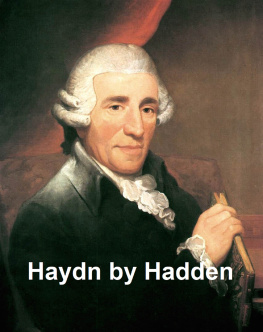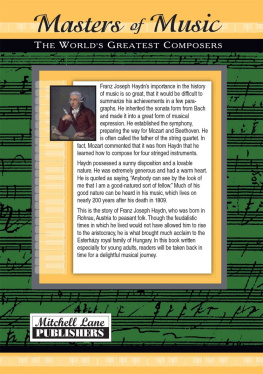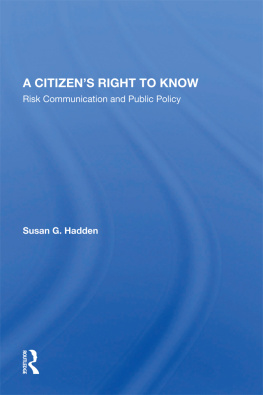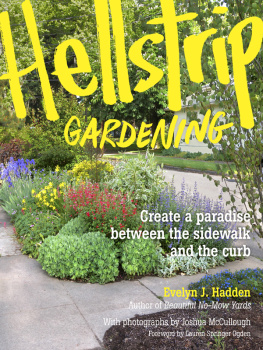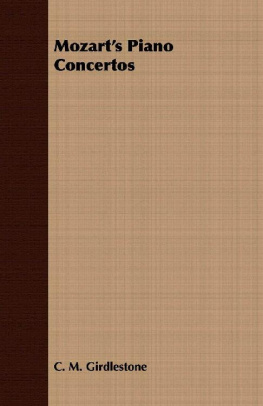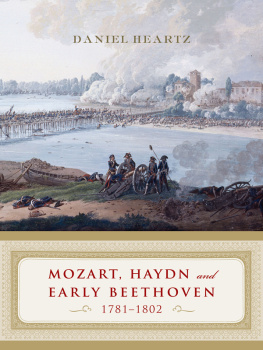J. Cuthbert Hadden - Haydn
Here you can read online J. Cuthbert Hadden - Haydn full text of the book (entire story) in english for free. Download pdf and epub, get meaning, cover and reviews about this ebook. year: 2017, publisher: Seltzer Books, genre: Non-fiction. Description of the work, (preface) as well as reviews are available. Best literature library LitArk.com created for fans of good reading and offers a wide selection of genres:
Romance novel
Science fiction
Adventure
Detective
Science
History
Home and family
Prose
Art
Politics
Computer
Non-fiction
Religion
Business
Children
Humor
Choose a favorite category and find really read worthwhile books. Enjoy immersion in the world of imagination, feel the emotions of the characters or learn something new for yourself, make an fascinating discovery.
- Book:Haydn
- Author:
- Publisher:Seltzer Books
- Genre:
- Year:2017
- Rating:3 / 5
- Favourites:Add to favourites
- Your mark:
- 60
- 1
- 2
- 3
- 4
- 5
Haydn: summary, description and annotation
We offer to read an annotation, description, summary or preface (depends on what the author of the book "Haydn" wrote himself). If you haven't found the necessary information about the book — write in the comments, we will try to find it.
Haydn — read online for free the complete book (whole text) full work
Below is the text of the book, divided by pages. System saving the place of the last page read, allows you to conveniently read the book "Haydn" online for free, without having to search again every time where you left off. Put a bookmark, and you can go to the page where you finished reading at any time.
Font size:
Interval:
Bookmark:

Published by Seltzer Books
established in 1974, now offering over 14,000 books
feedback welcome: seltzer@seltzerbooks.com
Biographies of musicians, available from Seltzer Books:
Love Affairs of Great Musicians by Hughes
Among the Great Masters of Music by Rowlands
Beethoven: a Character Study by Fischer
Beethoven's Letters
Chopin and Other Musical Essays by Finck
Mozart, the Man and the Artist by Kerst
Life of Chopin by Liszt
Wagner by Runciman
My Life by Wagner
The World's Great Men of Music by Brower
Musical Memories by Saint-Saens
Haydn by Hadden
Handel by Dent
Great Itallian and French Composers by Ferris
Great German Composers by Ferris
Edward MacDowell, a Great American Tone Poet by Porte
FROM THE MASTER MUSICIANS SERIES
To The Rev. Robert Blair, D.D. In Grateful Acknowledgment of Many Kindnesses and Much Pleasant Intercourse
The authority for Haydn's life is the biography begun by the late Dr. Pohl, and completed after his death by E.V. Mandyczewski. To this work, as yet untranslated, every subsequent writer is necessarily indebted, and the present volume, which I may fairly claim to be the fullest life of Haydn that has so far appeared in English, is largely based upon Pohl. I am also under obligations to Miss Pauline D. Townsend, the author of the monograph in the "Great Musicians" series. For the rest, I trust I have acquainted myself with all the more important references made to Haydn in contemporary records and in the writings of those who knew him. Finally, I have endeavoured to tell the story of his career simply and directly, to give a clear picture of the man, and to discuss the composer without trenching on the ground of the formalist.
J.C.H.
EDINBURGH, September 1902.
Introductory--Rohran--A Poor Home--Genealogy--Haydn's Parents-- His Birth--His Precocity--Informal Music-making--His First Teacher--Hainburg--"A Regular Little Urchin"--Attacks the Drum--A Piece of Good Luck--A Musical Examination--Goes to Vienna--Choir School of St Stephen's--A House of Suffering--Lessons at the Cathedral--A Sixteen-Part Mass--Juvenile Escapades--"Sang like a Crow"--Dismissed from the Choir.
Haydn's position, alike in music and in musical biography, is almost unique. With the doubtful exception of Sebastian Bach, no composer of the first rank ever enjoyed a more tranquil career. Bach was not once outside his native Germany; Haydn left Austria only to make those visits to England which had so important an influence on the later manifestations of his genius: His was a long, sane, sound, and on the whole, fortunate existence. For many years he was poor and obscure, but if he had his time of trial, he never experienced a time of failure. With practical wisdom he conquered the Fates and became eminent. A hard, struggling youth merged into an easy middle-age, and late years found him in comfortable circumstances, with a solid reputation as an artist, and a solid retiring-allowance from a princely patron, whose house he had served for the better part of his working career. Like Goethe and Wordsworth, he lived out all his life. He was no Marcellus, shown for one brief moment and "withdrawn before his springtime had brought forth the fruits of summer." His great contemporary, Mozart, cut off while yet his light was crescent, is known to posterity only by the products of his early manhood. Haydn's sun set at the end of a long day, crowning his career with a golden splendour whose effulgence still brightens the ever-widening realm of music.
Voltaire once said of Dante that his reputation was becoming greater and greater because no one ever read him. Haydn's reputation is not of that kind. It is true that he may not appeal to what has been called the "fevered modern soul," but there is an old-world charm about him which is specially grateful in our bustling, nerve-destroying, bilious age. He is still known as "Papa Haydn," and the name, to use Carlyle's phrase, is "significant of much." In the history of the art his position is of the first importance. He was the father of instrumental music. He laid the foundations of the modern symphony and sonata, and established the basis of the modern orchestra. Without him, artistically speaking, Beethoven would have been impossible. He seems to us now a figure of a very remote past, so great have been the changes in the world of music since he lived. But his name will always be read in the golden book of classical music; and whatever the evolutionary processes of the art may bring, the time can hardly come when he will be forgotten, his works unheard.
Rohrau
Franz Joseph Haydn was born at the little market-town of Rohrau, near Prugg, on the confines of Austria and Hungary, some two-and- a-half hours' railway journey from Vienna. The Leitha, which flows along the frontier of Lower Austria and Hungary on its way to the Danube, runs near, and the district
[Figure: Haydn's birth-house at Rohrau]
is flat and marshy. The house in which the composer was born had been built by his father. Situated at the end of the market- place, it was in frequent danger from inundation; and although it stood in Haydn's time with nothing worse befalling it than a flooding now and again, it has twice since been swept away, first in 1813, fours years after Haydn's death, and again in 1833. It was carefully rebuilt on each occasion, and still stands for the curious to see--a low-roofed cottage, very much as it was when the composer of "The Creation" first began to be "that various thing called man." A fire unhappily did some damage to the building in 1899. But excepting that the picturesque thatched roof has given place to a covering of less inflammable material, the "Zum Haydn" presents its extensive frontage to the road, just as it did of yore. Our illustration shows it exactly as it is today. [See an interesting account of a visit to the cottage after the fire, in The Musical Times for July 1899.] Schindler relates that when Beethoven, shortly before his death, was shown a print of the cottage, sent to him by Diabelli, he remarked: "Strange that so great a man should have been born in so poor a home!" Beethoven's relations with Haydn, as we shall see later on, were at one time somewhat strained; but the years had softened his asperity, and this indirect tribute to his brother composer may readily be accepted as a set-off to some things that the biographer of the greater genius would willingly forget.
A Poor Home
It was indeed a poor home into which Haydn had been born; but tenderness, piety, thrift and orderliness were there, and probably the happiest part of his career was that which he spent in the tiny, dim-lighted rooms within sound of Leitha's waters.
In later life, when his name had been inscribed on the roll of fame, he looked back to the cottage at Rohrau, "sweet through strange years," with a kind of mingled pride and pathetic regret. Flattered by the great and acclaimed by the devotees of his art, he never felt ashamed of his lowly origin. On the contrary, he boasted of it. He was proud, as he said, of having "made something out of nothing." He does not seem to have been often at Rohrau after he was launched into the world, a stripling not yet in his teens. But he retained a fond memory of his birthplace. When in 1795 he was invited to inspect a monument erected to his honour in the grounds of Castle Rohrau, he knelt down on the threshold of the old home by the market-place and kissed the ground his feet had trod in the far-away days of youth. When he came to make his will, his thoughts went back to Rohrau, and one of his bequests provided for two of its poorest orphans.
Font size:
Interval:
Bookmark:
Similar books «Haydn»
Look at similar books to Haydn. We have selected literature similar in name and meaning in the hope of providing readers with more options to find new, interesting, not yet read works.
Discussion, reviews of the book Haydn and just readers' own opinions. Leave your comments, write what you think about the work, its meaning or the main characters. Specify what exactly you liked and what you didn't like, and why you think so.

